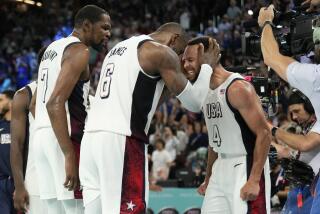Previewing the U.S.-Canada gold-medal menâs hockey game
When Team Canada faltered in the first round of the Olympic hockey tournament, the nation that prides itself on having invented the game held its collective breath. Not to worry: A romp over Germany in a qualifying game and a rout of Russia put this star-laden team back on track.
Or did it?
Canada barely hung on to defeat fast-closing Slovakia in the semifinals and secure its place in Sundayâs gold-medal game at Canada Hockey Place. Adversity could bring the Canadians closer -- or exhaust them.
The U.S. has run the table, relying on perseverance to subdue the stubborn Swiss in the quarterfinals and using physicality and speed to embarrass Finland in a 6-1 blowout. They have no game breakers -- the closest to that is Chicago winger Patrick Kane -- but their teamwork and energy have fueled their success.
Canada last won gold in 2002, defeating the U.S. at Salt Lake City. The U.S. men have won hockey gold twice: at Squaw Valley in 1960 and at Lake Placid in 1980. Today is the 50th anniversary of the Squaw Valley triumph.
Here are the key matchups. The U.S. is designated the home team because of its superior seeding and will have the last line change.
Goal
Roberto Luongo truly has home-ice advantage playing in the arena where he tends goal for the Vancouver Canucks. He took over from Martin Brodeur after Canadaâs loss to the U.S. and has played well under duress. He has a .919 save percentage and 1.75 goals-against average.
Ryan Miller of the U.S. and the Buffalo Sabres tops all goalies with a .954 save percentage and 1.04 goals-against average. He stopped 42 shots by Canada in Team USAâs 5-3 preliminary-round victory last Sunday. He blanked Switzerland in the quarterfinals and shut out Finland for 48 minutes 29 seconds until he was given the rest of the semifinal off. His calmness and firm focus have given stability to a largely young team.
Defense
Scott Niedermayer hasnât lifted his game as much as might have been expected and Chris Pronger has looked slow at times, reasons why Canada Coach Mike Babcock didnât have either one on the ice while protecting a one-goal lead over Slovakia and went with the far more effective pair of Duncan Keith and Drew Doughty. Shea Weber has had an exceptional tournament at both ends of the ice.
Brian Rafalski, Team USAâs senior citizen at 36, leads the tournament with four goals and eight points. Heâs part of a defense that has become more than the sum of its parts: Ryan Suter is a healthy +8 and Jack Johnson, Erik Johnson and Tim Gleason have provided puck movement and muscle.
Forwards
Dany Heatley and his San Jose linemates, Joe Thornton and Patrick Marleau, remain Canadaâs most effective trio because of their size, skill and familiarity. Chicagoâs Jonathan Toews has been the top two-way player; heâs a tournament-best +9 defensively and has earned seven assists in six games, most recently on a line with Mike Richards and Rick Nash. Sidney Crosby (three goals, six points) has yet to dominate. The line of Dallasâ Brenden Morrow and Ryan Getzlaf and Corey Perry of the Ducks has been Canadaâs best the last two games. Theyâre big and rugged and tough to stop.
For the U.S., New Jerseyâs Zach Parise has blossomed here, collecting three goals and seven points. Kane has game-breaking speed and skill. But this team does its best work down low and by banging and crashing to win the puck and barging to the net for screens and tips. David Backes of St. Louis uses his size well, and Chris Drury has justified his selection with his penalty killing and leadership.
This one is too close to call. The U.S. can win, but Canada should draw energy from the crowd and a nation of hockey-crazed fans.
-- Helene Elliott
More to Read
Go beyond the scoreboard
Get the latest on L.A.'s teams in the daily Sports Report newsletter.
You may occasionally receive promotional content from the Los Angeles Times.






